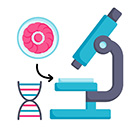
Understanding Hyperprolactinemia and Infertility: A Specialist’s Story
A few years ago, I met Emily, a 28-year-old marketing professional. She had been trying to conceive for over a year, and her frustration was palpable. Emily’s cycles were irregular, and she occasionally experienced unexplained breast tenderness and discharge. Yet, she hadn’t thought much of these symptoms until she realized her dream of becoming a mother wasn’t coming true. When Emily walked into my clinic, I suspected something more than a typical hormonal imbalance might be at play.
After running a series of tests, we discovered Emily had hyperprolactinemia, a condition characterized by elevated levels of prolactin, a hormone produced by the pituitary gland. This was a turning point in Emily’s journey and a powerful reminder of how crucial prolactin balance is for fertility.

What Is Hyperprolactinemia?
Hyperprolactinemia occurs when the body produces too much prolactin. While prolactin is essential for breastfeeding, elevated levels outside of pregnancy and lactation can disrupt the delicate balance of reproductive hormones. Prolactin primarily affects the hypothalamus-pituitary-ovarian axis, which plays a key role in regulating menstrual cycles and ovulation.
Dr. Sarah Michaels, an endocrinologist, explains,
“Prolactin is like a dimmer switch for reproductive hormones. Too much of it can turn down the signals your body needs for ovulation.”
Hyperprolactinemia is often overlooked, but it’s a leading cause of ovulatory dysfunction and infertility.

How Hyperprolactinemia Causes Infertility
Elevated prolactin levels interfere with the release of gonadotropin-releasing hormone (GnRH), which in turn affects follicle-stimulating hormone (FSH) and luteinizing hormone (LH). This chain reaction leads to:
- Disrupted Ovulation: Without the proper hormonal signals, ovulation may become irregular or stop altogether.
- Luteal Phase Deficiency: Even if ovulation occurs, high prolactin can impact the quality of the luteal phase, reducing the chances of successful implantation.
- Low Estrogen Levels: Hyperprolactinemia often suppresses estrogen production, causing symptoms like vaginal dryness and thinning of the uterine lining.
Emily’s blood tests revealed prolactin levels significantly above the normal range, which explained her irregular cycles and infertility.
Causes of Hyperprolactinemia
Over the years, I’ve identified several common triggers for hyperprolactinemia:
- Pituitary Adenomas (Prolactinomas): Benign tumors in the pituitary gland are a leading cause of high prolactin levels.
- Medications: Certain drugs, like antidepressants, antipsychotics, and high-dose birth control pills, can increase prolactin production.
- Hypothyroidism: An underactive thyroid can indirectly cause hyperprolactinemia by increasing thyrotropin-releasing hormone (TRH), which stimulates prolactin production.
- Stress: Chronic stress, while not a direct cause, can exacerbate the condition by disrupting hormonal balance.
For Emily, further imaging revealed a small prolactinoma. While the diagnosis was intimidating, it gave us a clear path forward.
Diagnosing Hyperprolactinemia
Diagnosing hyperprolactinemia starts with a blood test to measure prolactin levels. If levels are elevated, further evaluation is needed, including:
- Thyroid Function Tests: To rule out hypothyroidism as a cause.
- MRI of the Pituitary Gland: To check for the presence of a prolactinoma or other abnormalities.
- Medication Review: To identify drugs that might be contributing to the issue.
Emily’s prolactin levels were three times higher than normal, which prompted us to order an MRI, ultimately confirming the presence of a small tumor.
Treatment Options for Hyperprolactinemia
The good news is that hyperprolactinemia is highly treatable. Here are the most common approaches:
- Medications: Dopamine agonists like bromocriptine or cabergoline are the first line of treatment. These drugs lower prolactin levels by increasing dopamine activity, which inhibits prolactin production.
- Surgery: In cases where medication isn’t effective or well-tolerated, surgery to remove a prolactinoma may be necessary.
- Managing Underlying Conditions: Treating hypothyroidism or adjusting medications can resolve hyperprolactinemia in some cases.
Dr. Ahmed Khalid, a reproductive endocrinologist, emphasizes,
“Dopamine agonists are incredibly effective, not only in normalizing prolactin levels but also in restoring ovulation for many patients.”
Emily started on cabergoline, which quickly brought her prolactin levels back to normal. Within three months, her cycles became regular.
The Emotional Toll of Hyperprolactinemia
Infertility caused by hyperprolactinemia often feels like an invisible struggle. Many patients, like Emily, feel frustrated by the lack of obvious symptoms or clear answers.
Emily once told me, “I felt like I was doing everything right—eating healthy, exercising, tracking my cycles—but nothing worked. Finding out it was my prolactin was both a relief and a shock.”
This is why emotional support is as important as medical treatment. Counseling, support groups, and open communication with healthcare providers can make the journey easier.
Emily’s Path to Parenthood
After three months on medication, Emily’s prolactin levels stabilized, and her cycles became consistent. Six months later, she conceived naturally. Holding her newborn daughter in my office a year later was one of the most rewarding moments of my career.
Final Thoughts
Hyperprolactinemia is a common yet underdiagnosed cause of infertility. With early detection, proper treatment, and emotional support, most women can overcome it and achieve their dream of motherhood.
If you’re struggling with infertility and suspect hormonal imbalances, don’t hesitate to seek help. A simple blood test could be the key to unlocking your path to parenthood. Remember, you’re not alone, and there’s always hope.







